The common conception of the domesticated cat is that it lays about, purrs, and occasionally chases a laser pointer; however, cats can do much more if given the opportunity. Working cats spend their day keeping a variety of sites clean of rodents that can carry disease, and cause damage to crops, livestock, and property. Working cats provide a ‘green’ way of dealing with rodent problems, sidestepping the need to utilize poison to control and keep away harmful rodent populations.
Using poison, gas, or traps are time-consuming, expensive, and ultimately ineffective in the long-term.
How Do Working Cats Work?
Working cats are the most green, effective, and cost-effective way of controlling rodent (especially rat/mouse) problems. They only require food, proper shelter, and periodic veterinary care and vaccinations.
Otherwise known as ‘bran cats’, working cats are often used to scare (and keep) away rodents from a variety of locations including warehouses (both food and product), nurseries, barns and stables, factories, farms, and grain silos—working cats can work anywhere there is a need for rodent control, as long as they are provided with food, shelter and proper healthcare.
Working cats don’t have to physically hunt and catch rodents in order to have an impact on the infestation problem being addressed; just their presence drives away rats and other rodents from their newly established territory; however, they will stalk, chase, and catch mice, rats and other small rodents to fulfill their hunter’s nature. If they are fed properly, generally they will not eat their catch. Keeping a working cat hungry is not necessary to keep them interested in hunting, so it is important to keep them well-fed so they can live a healthy life and be able to do their job. Generally, any site that brings on a working cat they will often see an almost immediate effect, and after several weeks the site will be free of rodents.
Adopting a Working Cat
Working cats are generally available through working cat adoption programs, and are usually feral cats which have been rescued and need to be placed with adoptive homes in order to avoid being euthanized.
Local rescue organizations usually have programs for placing feral cats, so if you are looking to use a cat to address an ongoing rodent problem, it will be necessary to get in touch with a local rescue organization and work with them to find a suitable cat for your location.
It is important to note that not everyone who applies will receive a cat, as there are certain rules that are applied when picking the proper home for the rescue cats. Volunteers from the rescue organization will work with you to determine whether or not you and your site is an appropriate candidate for a working cat.
By adopting a working cat, you can not only deal with rodent issues on your property, but to also provide a loving and safe home for a feral cat that might otherwise be faced with life-threatening dangers in a world that is not designed around the life of a feral cat.

